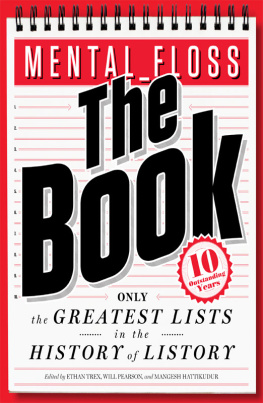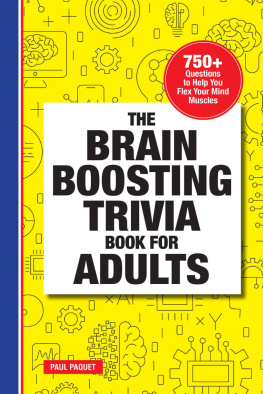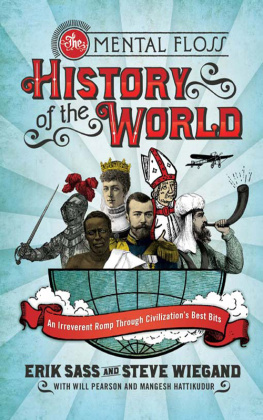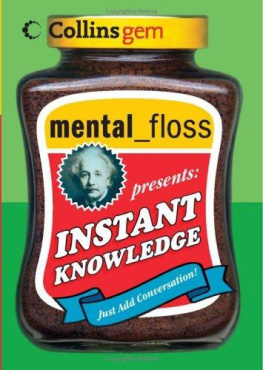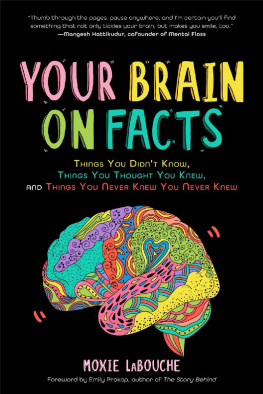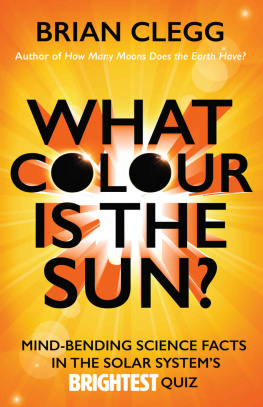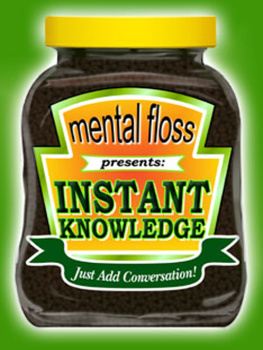mental_floss magazine was just one of a hundred semiamusing ideas that came out of our floors late-night dorm room conversations at Duke University. There was, of course, the heated driveway company, that hoped to melt away morning frost and make snow shoveling a thing of the past. And the pet lobster farm, which not only intended to breed pedigree lobsters as domestic companions, but also carry fine lobster accessoriessuch as tiny leashes, sweaters, and mittens. And who could forget the Great American Pudding Truck? The idea was to get a cement mixing truck, fill it with pudding, and roam the country squirting gelatinous goodies into the pudgy hands of kids on every block. Brilliant, right? Well, if one thing was made abundantly clear to us in college, it was that there was a whole world of opportunities just waiting to be tapped by dreamers like ourselves. So, why then did we pursue mental_floss ? Maybe because of all the ideas on the table, its the one that made us grin the widest.
Statistically speaking, mental_floss never should have launched. Consider the facts: two 21-year-old kids with no industry experience, no journalism background, and no real money to throw around decide to start a national publication. Add to that the fact that the year we decided to launch was considered the worst economy for magazines since World War II. Ad money was down dramatically, and high profile publications like Talk , George, and Mademoiselle were all forced to close shop.
Not exactly the best timing. But when youre as quietly mischievous as we are, stats dont faze you. mental_floss was exactly the sort of magazine we wanted to find in our mailbox every monthsomething that was hip and quick and quirky and fun, but really left you feeling smarter. You know? A sort of bible for trivia addicts. A quick fix for knowledge junkies. Something that truly blurred the lines between education and entertainment. So we hunted for it. We scoured bookstores. We rummaged newsstands. And when we couldnt find the magazine we were looking for, we decided to go out and create it.
Fast forward a few years later, and mental_floss still has us smiling. After all, weve managed to get away with a Swimsuit issue (featuring 15 geniuses, from Einstein to Eleanor Roosevelt stripped down to their skivvies), a Saints and Sinners issue (that had Mother Theresa, Gandhi, Nelson Mandela, and Madonna all fighting for cover space), and even a Lies Your Mother Told You issue featuring all the so-called facts people have been trying to slip past you for years. But now that were growing older, wiser, maybe even a little more mature (emphasis on little), were starting to branch out. Condensed Knowledge is mental_ flosss first adventure in the book world, and well, were pretty darn excited about it. Weve gathered seventeen experts, thousands of facts, and slapped the work silly in typical mental_floss style. So go ahead: skim a few pages, ease into the paragraph of your choice. And if youre not hopelessly addicted in a matter of minutes, well do our best to understand. After all, we still have the pudding truck business to fall back on.
Happy flossing,
Will and Mangesh
A Feast for Hungry Minds
People love to feel smart, but would prefer not to have to work for the knowledge. Theres a good reason we like the Dummies books, Cliffs Notes, and bulleted summaries; were active people without a lot of time on our hands. Its the same reason fast food, insta-photos, and dry cleaning are so popular. We want it all, we want it quickly, andif possiblewed like it supersized (no mayo).
You think you have the time or energy to delve into ancient religious tomes to uncover the basic tenets of Islam by yourself? We think not. Learning Arabic, even on tape, is a four-month process in and of itself. Besides, youve got better things to do.
Sadly, when it comes down to it, were just not all that book-smart. Were fuzzy on the facts. We have trouble telling the Bill of Rights from a bill of lading, astronomy from astrology, or Madonna from, well, Madonna. Most people think Hercules is a pro wrestler, and Descartes a snail or dessert wine.
Its not our teachers faults: our hormones were raging, we were bored out of our minds, hungry, afraid of the class bully, and looking to hitch a ride with the first trucker whod take us far from our wretched neighborhood. And that was just elementary school.
Were not stupid, either; we used to know all kinds of stuffweve just forgotten. Given our study habits, you can hardly blame us for our academic amnesia. Procrastination was the name of the scholastic game: we waited until ten minutes before class to attempt memorizing the names of every U.S. president, the 206 bones in the human body, that frickin chemistry chart, or some Shakespearean sonnetonly to pass by the skin of our braced teeth. We crammed, we jammed, we purged.
The idea of Condensed Knowledge is for readers to stroll up to the buffet line of basics and take a heaping plateful of smart(aleck). And one helping surely wont be enough to fill that big noggin of yours, so like Pavlovs puppies, youll ring the bell again and again. In this process, you will begin to make connections you never thought possible: like how the Industrial Revolution was critical to the invention of the snowboard, that without space travel thered be no Twinkie, and that there are simple dance steps that can bring you closer to God.
Most of us are more interested in the big picture than in the microscopic minutiae of molecules, Sanskrit, or caloric intake; we leave that to folks like Einstein, Bill Gates, and Oprah. And now, thanks to the insanely bright crew of expert authors assembled here, critical events and ideas in fifteen fields of study have been distilled into easy Mc-Nugget-size chunks. Then its up to you to connect the dots.
Confucius said, To know that we know what we know, and that we do not know what we do not know, that is true knowledge. All we know is, that makes our heads hurt, and that Sir Francis Bacon (no relation to Kevin Bacon) said it better: Knowledge is power.
Youll become top dog at the water cooler, a whiz at home Jeopardy!, an arbitrator of stupid bets your friends make. Kids will gather at your feet to hear your tales of wisdom, your lovers will finally be impressed, politicos will beg you to run for president. What you do with this newfound power is up to you. We hope you use it wisely.
Michael A. Stusser , a regular contributor, still remembers meeting the first issue of mental_floss magazine. The pair have worked happily ever after ever since, spending their waking hours making sweet, sweet, articles together.
Forgeries, thefts, and outright vandalism? Thats right. Art historys about to get a whole lot more interesting.
Every age sees art through its own eyes, and the cleverest forgers play up to this. One of the most notorious forgeries ever occurred in the 1930s. A Dutchman named Han van Meegeren (18891947) produced forgeries of early works by the Dutch 17th-century master Jan Vermeer. They were technically brilliant and faultless, using old canvas and the correct 17th-century pigments. Cunningly, van Meegeren chose religious imagery that some experts believed Vermeer had painted, but very few examples of which existed. Most (though not all) of the greatest experts were completely taken in, but when you see the paintings now, youll wonder why. All the faces look like the great film stars of the 1930s, such as Marlene Dietrich and Douglas Fairbanks.


